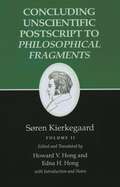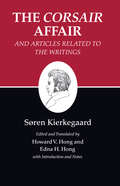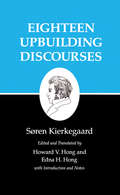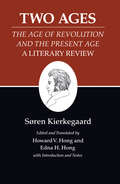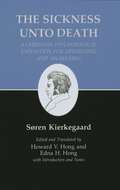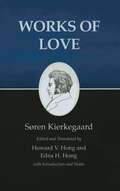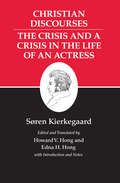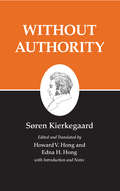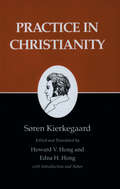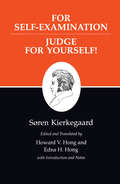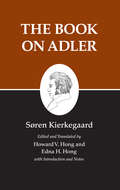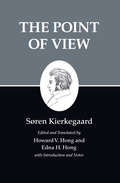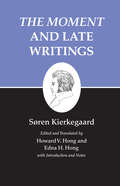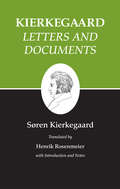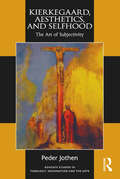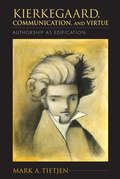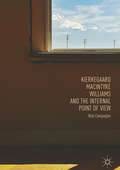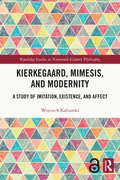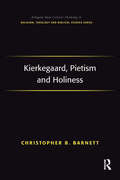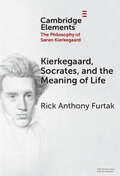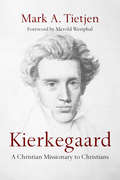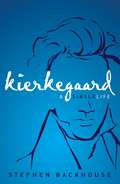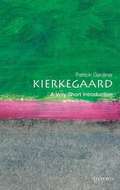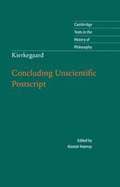- Table View
- List View
Kierkegaard's Writings, XII, Volume II: Concluding Unscientific Postscript to Philosophical Fragments (Kierkegaard's Writings #39)
by Søren KierkegaardIn Philosophical Fragments the pseudonymous author Johannes Climacus explored the question: What is required in order to go beyond Socratic recollection of eternal ideas already possessed by the learner? Written as an afterword to this work, Concluding Unscientific Postscript is on one level a philosophical jest, yet on another it is Climacus's characterization of the subjective thinker's relation to the truth of Christianity. At once ironic, humorous, and polemical, this work takes on the "unscientific" form of a mimical-pathetical-dialectical compilation of ideas. Whereas the movement in the earlier pseudonymous writings is away from the aesthetic, the movement in Postscript is away from speculative thought. Kierkegaard intended Postscript to be his concluding work as an author. The subsequent "second authorship" after The Corsair Affair made Postscript the turning point in the entire authorship. Part One of the text volume examines the truth of Christianity as an objective issue, Part Two the subjective issue of what is involved for the individual in becoming a Christian, and the volume ends with an addendum in which Kierkegaard acknowledges and explains his relation to the pseudonymous authors and their writings. The second volume contains the scholarly apparatus, including a key to references and selected entries from Kierkegaard's journals and papers.
Kierkegaard's Writings, XIII: The "Corsair Affair" and Articles Related to the Writings
by Howard V. Hong Edna H. Hong Søren KierkegaardThe Corsair affair has been called the "most renowned controversy in Danish literary history." At the center is Søren Kierkegaard, whose pseudonymous Stages on Life's Way occasioned a frivolous and dishonorable review by Peder Ludvig Møller. Møller was associated with The Corsair, a publication notorious for gossip and caricature. The editor was Meïr Goldschmidt, an acquaintance of Kierkegaard's and an admirer of his early work. Kierkegaard struck back at not only Møller and Goldschmidt but at the paper as a whole. The present volume contains all of the documents relevant to this dispute, plus a historical introduction that recapitulates the sequence of events surrounding the controversy. Parts I (Article) and II (Addenda) contain articles both signed by and attributed to Kierkegaard in response to the affair. A supplement includes writings pertaining to the Corsair affair by Goldschmidt and Møller, as well as unpublished pieces by Kierkegaard from his journals and papers. Although the immediate occasion was literary, for Kierkegaard the issues as well as the consequences were ethical, social, philosophical, and religious. Howard Hong argues that the most important consequence was wholly unexpected and unintended: the second phase of Kierkegaard's authorship.
Kierkegaard's Writings, XIV
by Howard V. Hong Edna H. Hong Søren KierkegaardAfter deciding to terminate his authorship with the pseudonymous Concluding Unscientific Postscript, Kierkegaard composed reviews as a means of writing without being an author. Two Ages, here presented in a definitive English text, is simultaneously a review and a book in its own right. In it, Kierkegaard comments on the anonymously published Danish novel Two Ages, which contrasts the mentality of the age of the French Revolution with that of the subsequent epoch of rationalism. Kierkegaard commends the author's shrewdness, and his critique builds on the novel's view of the two generations. With keen prophetic insight, Kierkegaard foresees the birth of an impersonal cultural wasteland, in which the individual will either be depersonalized or obliged to find an existence rooted in "equality before God and equality with all men." This edition, like all in the series, contains substantial supplementary material, including a historical introduction, entries from Kierkegaard's journals and papers, and the preface and conclusion of the original novel.
Kierkegaard's Writings, XIV: "The Age of Revolution" and the "Present Age" A Literary Review
by Howard V. Hong Edna H. Hong Søren KierkegaardAfter deciding to terminate his authorship with the pseudonymous Concluding Unscientific Postscript, Kierkegaard composed reviews as a means of writing without being an author. Two Ages, here presented in a definitive English text, is simultaneously a review and a book in its own right. In it, Kierkegaard comments on the anonymously published Danish novel Two Ages, which contrasts the mentality of the age of the French Revolution with that of the subsequent epoch of rationalism. Kierkegaard commends the author's shrewdness, and his critique builds on the novel's view of the two generations. With keen prophetic insight, Kierkegaard foresees the birth of an impersonal cultural wasteland, in which the individual will either be depersonalized or obliged to find an existence rooted in "equality before God and equality with all men." This edition, like all in the series, contains substantial supplementary material, including a historical introduction, entries from Kierkegaard's journals and papers, and the preface and conclusion of the original novel.
Kierkegaard's Writings, XIX, Volume 19: Sickness Unto Death: A Christian Psychological Exposition for Upbuilding and Awakening (Kierkegaard's Writings #19)
by Søren KierkegaardA companion piece to The Concept of Anxiety, this work continues Søren Kierkegaard's radical and comprehensive analysis of human nature in a spectrum of possibilities of existence. Present here is a remarkable combination of the insight of the poet and the contemplation of the philosopher. In The Sickness unto Death, Kierkegaard moves beyond anxiety on the mental-emotional level to the spiritual level, where--in contact with the eternal--anxiety becomes despair. Both anxiety and despair reflect the misrelation that arises in the self when the elements of the synthesis--the infinite and the finite--do not come into proper relation to each other. Despair is a deeper expression for anxiety and is a mark of the eternal, which is intended to penetrate temporal existence.
Kierkegaard's Writings, XVI, Volume 16: Works of Love (Kierkegaard's Writings #47)
by Søren KierkegaardThe various kinds and conditions of love are a common theme for Kierkegaard, beginning with his early Either/Or, through "The Diary of the Seducer" and Judge William's eulogy on married love, to his last work, on the changelessness of God's love. Works of Love, the midpoint in the series, is also the monumental high point, because of its penetrating, illuminating analysis of the forms and sources of love. Love as feeling and mood is distinguished from works of love, love of the lovable from love of the unlovely, preferential love from love as the royal law, love as mutual egotism from triangular love, and erotic love from self-giving love. This work is marked by Kierkegaard's Socratic awareness of the reader, both as the center of awakened understanding and as the initiator of action. Written to be read aloud, the book conveys a keenness of thought and an insightful, poetic imagination that make such an attentive approach richly rewarding. Works of Love not only serves as an excellent place to begin exploring the writings of Kierkegaard, but also rewards many rereadings.
Kierkegaard's Writings, XVII: The Crisis and a Crisis in the Life of an Actress.
by Howard V. Hong Edna H. Hong Søren KierkegaardFirst published in 1848, Christian Discourses is a quartet of pieces written and arranged in contrasting styles. Parts One and Three, "The Cares of the Pagans" and "Thoughts That Wound from Behind--for Upbuilding," serve as a polemical overture to Kierkegaard's collision with the established order of Christendom. Yet Parts Two and Four, "Joyful Notes in the Strife of Suffering" and "Discourses at the Communion on Fridays," are reassuring affirmations of the joy and blessedness of Christian life in a world of adversity and suffering. Written in ordinary language, the work combines simplicity and inwardness with reflection and presents crucial Christian concepts and presuppositions with unusual clarity. Kierkegaard continued in the pattern that he began with his first pseudonymous esthetic work, Either/Or, by pairing Christian Discourses with The Crisis, an unsigned esthetic essay on contemporary Danish actress Joanne Luise Heiberg.
Kierkegaard's Writings, XVIII: Without Authority
by Howard V. Hong Edna H. Hong Søren Kierkegaard"Without authority," a phrase Kierkegaard repeatedly applied to himself and his writings, is an appropriate title for this volume of five short works that in various ways deal with the concept and practice of authority. The Lily in the Field and the Bird of the Air contemplates the teaching authority of these creatures based on three different passages in the Gospels. The first of Two Ethical-Religious Essays mediates on the ethics of Jesus' martyrdom; the second contrasts the authority of the genius with that of the apostle. The remaining works--Three Discourses at the Communion on Fridays (1849), An Upbuilding Discourse (1850), and Two Discourses at the Communion on Fridays (1851)--are meditations on sin, forgiveness, and the power of love.
Kierkegaard's Writings, XX: Practice in Christianity
by Howard V. Hong Edna H. Hong Søren KierkegaardOf the many works he wrote during 1848, his "richest and most fruitful year," Kierkegaard specified Practice in Christianity as "the most perfect and truest thing." In his reflections on such topics as Christ's invitation to the burdened, the imitatio Christi, the possibility of offense, and the exalted Christ, he takes as his theme the requirement of Christian ideality in the context of divine grace. Addressing clergy and laity alike, Kierkegaard asserts the need for institutional and personal admission of the accommodation of Christianity to the culture and to the individual misuse of grace. As a corrective defense, the book is an attempt to find, ideally, a basis for the established order, which would involve the order's ability to acknowledge the Christian requirement, confess its own distance from it, and resort to grace for support in its continued existence. At the same time the book can be read as the beginning of Kierkegaard's attack on Christendom. Because of the high ideality of the contents and in order to prevent the misunderstanding that he himself represented that ideality, Kierkegaard writes under a new pseudonym, Anti-Climacus.
Kierkegaard's Writings, XXI: For Self-Examination / Judge For Yourself!
by Howard V. Hong Edna H. Hong Søren KierkegaardFor Self-Examination and its companion piece Judge for Yourself! are the culmination of Søren Kierkegaard's "second authorship," which followed his Concluding Unscientific Postscript. Among the simplest and most readily comprehended of Kierkegaard's books, the two works are part of the signed direct communications, as distinguished from his earlier pseudonymous writings. The lucidity and pithiness, and the earnestness and power, of For Self-Examination and Judge for Yourself! are enhanced when, as Kierkegaard requested, they are read aloud. They contain the well-known passages on Socrates' defense speech, how to read, the lover's letter, the royal coachman and the carriage team, and the painter's relation to his painting. The aim of awakening and inward deepening is signaled by the opening section on Socrates in For Self-Examination and is pursued in the context of the relations of Christian ideality, grace, and response. The secondary aim, a critique of the established order, links the works to the final polemical writings that appear later after a four-year period of silence.
Kierkegaard's Writings, XXII
by Howard V. Hong Edna H. Hong Søren KierkegaardAs a spiritual autobiography, Kierkegaard's The Point of View for My Work as an Author stands among such great works as Augustine's Confessions and Newman's Apologia pro Vita Sua. Yet Point of View is neither a confession nor a defense; it is an author's story of a lifetime of writing, his understanding of the maze of greatly varied works that make up his oeuvre. Upon the imminent publication of the second edition of Either/Or, Kierkegaard again intended to cease writing. Now was the time for a direct "report to history" on the authorship as a whole. In addition to Point of View, which was published posthumously, the present volume also contains On My Work as an Author, a contemporary substitute, and the companion piece Armed Neutrality.
Kierkegaard's Writings, XXII: The Point of View
by Howard V. Hong Edna H. Hong Søren KierkegaardAs a spiritual autobiography, Kierkegaard's The Point of View for My Work as an Author stands among such great works as Augustine's Confessions and Newman's Apologia pro Vita Sua. Yet Point of View is neither a confession nor a defense; it is an author's story of a lifetime of writing, his understanding of the maze of greatly varied works that make up his oeuvre. Upon the imminent publication of the second edition of Either/Or, Kierkegaard again intended to cease writing. Now was the time for a direct "report to history" on the authorship as a whole. In addition to Point of View, which was published posthumously, the present volume also contains On My Work as an Author, a contemporary substitute, and the companion piece Armed Neutrality.
Kierkegaard's Writings, XXIII
by Howard V. Hong Edna H. Hong Søren KierkegaardKierkegaard, a poet of ideals and practitioner of the indirect method, also had a direct and polemical side. He revealed this in several writings throughout his career, culminating in The Moment, his attack against the established ecclesiastical order. Kierkegaard was moved to criticize the church by his differences with Bishop Mynster, Primate of the Church of Denmark. Although Mynster saw in Kierkegaard a complement to himself and his outlook, Kierkegaard challenged Mynster to acknowledge the emptying and estheticizing of Christianity that had occurred in modern Christendom. For three years Kierkegaard was silent, waiting. When Mynster died, he was memorialized as "an authentic truth-witness" in the "holy chain of truth-witnesses that stretches through the ages from the days of the apostles." This struck Kierkegaard as blasphemous and inspired him to write a series of articles in Fædrelandet, which he followed with ten numbers of the pamphlet The Moment. This volume includes the articles from Fædrelandet, all numbers of The Moment, and several other late pieces of Kierkegaard's writing.
Kierkegaard's Writings, XXV
by Søren Kierkegaard Henrik RosenmeierThis volume provides the first English translation of all the known correspondence to and from Søren Kierkegaard, including a number of his letters in draft form and papers pertaining to his life and death. These fascinating documents offer new access to the character and lifework of the gifted philosopher, theologian, and psychologist. Kierkegaard speaks often and openly about his desire to correspond, and the resulting desire to write for a greater audience. He consciously recognizes letter-writing as an opportunity to practice composition. Unlike most correspondence, Kierkegaard's letters expressly "do not require a reply"--he insists on this as a principle, while he clearly and earnestly yearns for a response to his efforts. Among his other principles are purposefulness, directness, and the equality of a letter to a visit with a friend (Kierkegaard preferred the former to the latter). Perhaps more than anything else in print, Kierkegaard's Letters and Documents reveal his love affair with the written word.
Kierkegaard, Aesthetics, and Selfhood: The Art of Subjectivity (Routledge Studies in Theology, Imagination and the Arts)
by Peder JothenIn the digital world, Kierkegaard's thought is valuable in thinking about aesthetics as a component of human development, both including but moving beyond the religious context as its primary center of meaning. Seeing human formation as interrelated with aesthetics makes art a vital dimension of human existence. Contributing to the debate about Kierkegaard's conception of the aesthetic, Kierkegaard, Aesthetics, and Selfhood argues that Kierkegaard's primary concern is to provocatively explore how a self becomes Christian, with aesthetics being a vital dimension for such self-formation. At a broader level, Peder Jothen also focuses on the role, authority, and meaning of aesthetic expression within religious thought generally and Christianity in particular.
Kierkegaard, Communication, and Virtue: Authorship as Edification
by Mark A. Tietjen“Tietjen offers the kind of approach that encourages us to put the emphasis where it rightly belongs: on Kierkegaard’s philosophical ideas.” —Notre Dame Philosophical ReviewsIn contrast to recent postmodern and deconstructionist readings, Mark A. Tietjen believes that the purpose behind Kierkegaard’s writings is the moral and religious improvement of the reader. Tietjen defends Kierkegaard against claims that certain features of his works, such as pseudonymity, indirect communication, irony, and satire are self-deceived or deceitful. Kierkegaard, Communication, and Virtue reveals how they are directly related to the virtues or moral issues being discussed. In fact, Tietjen argues, the manner of presentation is a critical element of the philosophical message being conveyed. Reading broadly in Kierkegaard’s writings, he develops a hermeneutics of trust that fully illustrates Kierkegaard’s aim to evoke faith in his reader.“Tietjen’s critique of deconstructionist readings of Kierkegaard along with an emphasis on employing a hermeneutic of trust clearly distinguishes his work from other treatments of Kierkegaard as a virtue ethicist and edifying writer.” —Sylvia Walsh, Stetson University
Kierkegaard, MacIntyre, Williams, and the Internal Point of View
by Rob CompaijenThis book takes the debate about the (ir)rationality of the transition to ethical life in Kierkegaard’s thought in a significantly new direction. Connecting the field of Kierkegaard studies with the meta-ethical debate about practical reasons, and engaging with Alasdair MacIntyre’s and Bernard Williams’ thought, it explores the rationality of the choices for ethical life and Christian existence. Defending a so-called ‘internalist’ understanding of practical reasons, Compaijen argues that previous attempts to defend Kierkegaard against MacIntyre’s charge of irrationality have failed. He provides a thorough analysis of such fundamental topics as becoming oneself, the ideal of objectivity in ethics and religion, the importance of the imagination, the power and limits of philosophical argument, and the relation between grace and nature. This book will be of great interest to Kierkegaard scholars in philosophy and theology, and, more generally, to anyone fascinated by the rationality of the transition to ethical life and the choice to accept Christianity.
Kierkegaard, Mimesis, and Modernity: A Study of Imitation, Existence, and Affect (Routledge Studies in Nineteenth-Century Philosophy)
by Wojciech KaftanskiThis book challenges the widespread view of Kierkegaard’s idiosyncratic and predominantly religious position on mimesis. Taking mimesis as a crucial conceptual point of reference in reading Kierkegaard, this book offers a nuanced understanding of the relation between aesthetics and religion in his thought. Kaftanski shows how Kierkegaard's dialectical-existential reading of mimesis interlaces aesthetic and religious themes, including the familiar core concepts of imitation, repetition, and admiration as well as the newly arisen notions of affectivity, contagion, and crowd behavior. Kierkegaard’s enduring relevance to the malaises of our own day is firmly established by his classic concern for the meaning of human life informed by reflective meditation on the mimeticorigins of the contemporary age. Kierkegaard, Mimesis, and Modernity will be of interest to scholars and advanced students working on Kierkegaard, Continental philosophy, the history of aesthetics, and critical and religious studies.
Kierkegaard, Pietism and Holiness (Routledge New Critical Thinking in Religion, Theology and Biblical Studies)
by Christopher B. BarnettSøren Kierkegaard wrote that Pietism is 'the one and only consequence of Christianity'. Praise of this sort - particularly when coupled with Kierkegaard's significant personal connections to the movement in Christian spirituality known as Pietism - would seem to demand thorough investigation. And yet, Kierkegaard's relation to Pietism has been largely neglected in the secondary literature. Kierkegaard, Pietism and Holiness fills this scholarly gap and, in doing so, provides the first full-length study of Kierkegaard's relation to the Pietist movement. First accounting for Pietism's role in Kierkegaard's social, ecclesial, and intellectual background, Barnett goes on to demonstrate Pietism's impact on Kierkegaard's published authorship, principally regarding the relationship between Christian holiness and secular culture. This book not only establishes Pietism as a formative influence on Kierkegaard's life and thinking, but also sheds fresh light on crucial Kierkegaardian concepts, from the importance of 'upbuilding' to the imitation of Christ.
Kierkegaard, Socrates, and the Meaning of Life (Elements in the Philosophy of S?ren Kierkegaard)
by Rick Anthony FurtakKierkegaard's lifelong fascination with the figure of Socrates has many aspects, but prominent among them is his admiration for the way Socrates was devoted to his divinely ordained mission as a philosopher. To have such a destiny, revealed through what one loves and is passionate about as well as through a feeling of vocation, is a necessary condition of leading a meaningful life, according to Kierkegaard. Examining what Kierkegaard has to say about the meaning of life requires looking at his conception of 'subjective truth,' as well as how he understands the ancient ideal of 'amor fati,' a notion that Nietzsche would subsequently take up, but that Kierkegaard understands in a manner that is distinctly his own, and that he sought to put into practice in his own existence. Our life is a work of art, but we are not the artist.
Kierkegaard-Arg Philosophers: A Biography (Cambridge Texts In The History Of Philosophy Ser.)
by Alastair HannayFirst published in 1999. Routledge is an imprint of Taylor & Francis, an informa company.
Kierkegaard: A Christian Missionary to Christians
by Mark A. TietjenSøren Kierkegaard (1813-1855) had a mission. The church had become weak, flabby and inconsequential. Being a Christian was more a cultural heritage than a spiritual reality. His mission—reintroduce the Christian faith to Christians. How could he break through to people who were members of the church and thought they were Christians already? Like an Old Testament prophet, Kiergegaard used a variety of pointed and dramatic ways to shake people from their slumber. He incisively diagnosed the spiritual ailments of his age and offered a fresh take on classic Christian teaching. Mark Tietjen thinks that Kierkegaard's critique of his contemporaries strikes close to home today. We also need to listen to one of the most insightful yet complex Christian thinkers of any era. Through an examination of core Christian doctrines—the person of Jesus Christ, human nature, Christian witness and love—Tietjen helps us hear Kierkegaard's missionary message to a church that often fails to follow Christ with purity of heart.
Kierkegaard: A Single Life
by Stephen BackhouseDiscover a new understanding of Kierkegaard’s thought and his life, a story filled with romance, betrayal, humor, and riots. Kierkegaard, like Einstein and Freud, is one of those geniuses whose ideas permeate the culture and shape our world even when relatively few people have read their works. That lack of familiarity with the real Kierkegaard is about to change. This lucid new biography by scholar Stephen Backhouse presents the genius as well as the acutely sensitive man behind the brilliant books. Scholarly and accessible, Kierkegaard: A Single Life introduces his many guises—the thinker, the lover, the recluse, the writer, the controversialist—in prose so compelling it reads like a novel. One chapter examines Kierkegaard’s influence on our greatest cultural icons—Kafka, Barth, Bonhoeffer, Camus, and Martin Luther King Jr., to name only a few. A useful appendix presents an overview of each of Kierkegaard’s works, for the scholar and lay reader alike.
Kierkegaard: A Very Short Introduction
by Patrick GardinerScholars have largely misunderstood Soren Kierkegaard, remembering him chiefly in connection with the development of existentialist philosophy in this century. In a short and unhappy life, he wrote many books and articles on literary, satirical, religious and psychological themes, but the diversity and idiosyncratic style of his writing have contributed to a misunderstanding of his ideas. In this book--the only introduction to the full range of Kierkegaard's thought--Patrick Gardiner demonstrates how Kierkegaard developed his ideas and examines his thoughts in light of the doctrines on society developed by his contemporaries Marx and Feuerbach. Finally, he assesses the profound importance of Kierkegaard's ideas on the development of modern ways of thinking.
Kierkegaard: Concluding Unscientific Postscript
by Alastair Hannay Søren KierkegaardConcludes the first and richest phase of Kierkegaard's pseudonymous authorship and is the text that philosophers look to first when attempting to define Kierkegaard's own philosophy. Familiar Kierkegaardian themes are introduced in the work, including truth as subjectivity, indirect communication, the leap, and the impossibility of forming a philosophical system for human existence. The Postscript sums up the aims of the preceding pseudonymous works and opens the way to the next part of Kierkegaard's increasingly tempestuous life: it can thus be seen as a cornerstone of his philosophical thought. This volume offers the work in a new and accessible translation by Alastair Hannay, together with an introduction that sets the work in its philosophical and historical contexts.
